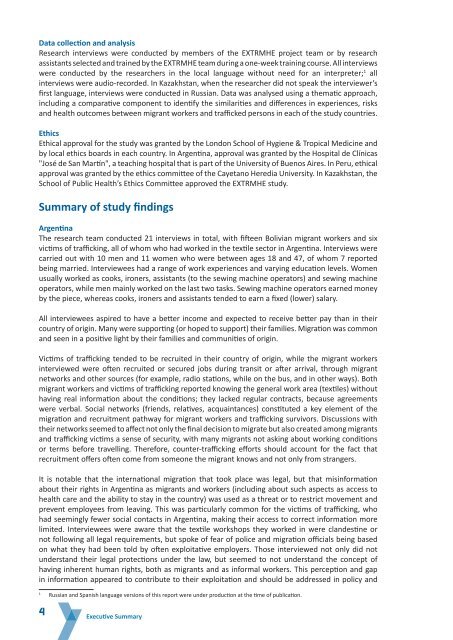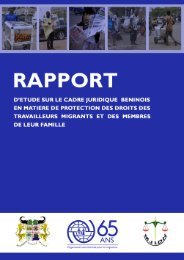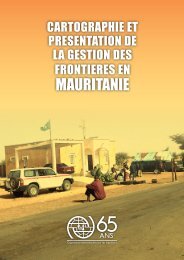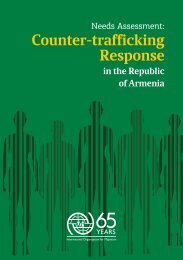Labour Exploitation Trafficking and Migrant Health
labour_exploitation_trafficking_en_0
labour_exploitation_trafficking_en_0
Create successful ePaper yourself
Turn your PDF publications into a flip-book with our unique Google optimized e-Paper software.
Data collection <strong>and</strong> analysis<br />
Research interviews were conducted by members of the EXTRMHE project team or by research<br />
assistants selected <strong>and</strong> trained by the EXTRMHE team during a one-week training course. All interviews<br />
were conducted by the researchers in the local language without need for an interpreter; 1 all<br />
interviews were audio-recorded. In Kazakhstan, when the researcher did not speak the interviewer’s<br />
first language, interviews were conducted in Russian. Data was analysed using a thematic approach,<br />
including a comparative component to identify the similarities <strong>and</strong> differences in experiences, risks<br />
<strong>and</strong> health outcomes between migrant workers <strong>and</strong> trafficked persons in each of the study countries.<br />
Ethics<br />
Ethical approval for the study was granted by the London School of Hygiene & Tropical Medicine <strong>and</strong><br />
by local ethics boards in each country. In Argentina, approval was granted by the Hospital de Clínicas<br />
"José de San Martín", a teaching hospital that is part of the University of Buenos Aires. In Peru, ethical<br />
approval was granted by the ethics committee of the Cayetano Heredia University. In Kazakhstan, the<br />
School of Public <strong>Health</strong>’s Ethics Committee approved the EXTRMHE study.<br />
Summary of study findings<br />
Argentina<br />
The research team conducted 21 interviews in total, with fifteen Bolivian migrant workers <strong>and</strong> six<br />
victims of trafficking, all of whom who had worked in the textile sector in Argentina. Interviews were<br />
carried out with 10 men <strong>and</strong> 11 women who were between ages 18 <strong>and</strong> 47, of whom 7 reported<br />
being married. Interviewees had a range of work experiences <strong>and</strong> varying education levels. Women<br />
usually worked as cooks, ironers, assistants (to the sewing machine operators) <strong>and</strong> sewing machine<br />
operators, while men mainly worked on the last two tasks. Sewing machine operators earned money<br />
by the piece, whereas cooks, ironers <strong>and</strong> assistants tended to earn a fixed (lower) salary.<br />
All interviewees aspired to have a better income <strong>and</strong> expected to receive better pay than in their<br />
country of origin. Many were supporting (or hoped to support) their families. Migration was common<br />
<strong>and</strong> seen in a positive light by their families <strong>and</strong> communities of origin.<br />
Victims of trafficking tended to be recruited in their country of origin, while the migrant workers<br />
interviewed were often recruited or secured jobs during transit or after arrival, through migrant<br />
networks <strong>and</strong> other sources (for example, radio stations, while on the bus, <strong>and</strong> in other ways). Both<br />
migrant workers <strong>and</strong> victims of trafficking reported knowing the general work area (textiles) without<br />
having real information about the conditions; they lacked regular contracts, because agreements<br />
were verbal. Social networks (friends, relatives, acquaintances) constituted a key element of the<br />
migration <strong>and</strong> recruitment pathway for migrant workers <strong>and</strong> trafficking survivors. Discussions with<br />
their networks seemed to affect not only the final decision to migrate but also created among migrants<br />
<strong>and</strong> trafficking victims a sense of security, with many migrants not asking about working conditions<br />
or terms before travelling. Therefore, counter-trafficking efforts should account for the fact that<br />
recruitment offers often come from someone the migrant knows <strong>and</strong> not only from strangers.<br />
It is notable that the international migration that took place was legal, but that misinformation<br />
about their rights in Argentina as migrants <strong>and</strong> workers (including about such aspects as access to<br />
health care <strong>and</strong> the ability to stay in the country) was used as a threat or to restrict movement <strong>and</strong><br />
prevent employees from leaving. This was particularly common for the victims of trafficking, who<br />
had seemingly fewer social contacts in Argentina, making their access to correct information more<br />
limited. Interviewees were aware that the textile workshops they worked in were cl<strong>and</strong>estine or<br />
not following all legal requirements, but spoke of fear of police <strong>and</strong> migration officials being based<br />
on what they had been told by often exploitative employers. Those interviewed not only did not<br />
underst<strong>and</strong> their legal protections under the law, but seemed to not underst<strong>and</strong> the concept of<br />
having inherent human rights, both as migrants <strong>and</strong> as informal workers. This perception <strong>and</strong> gap<br />
in information appeared to contribute to their exploitation <strong>and</strong> should be addressed in policy <strong>and</strong><br />
1<br />
Russian <strong>and</strong> Spanish language versions of this report were under production at the time of publication.<br />
4<br />
Executive Summary





